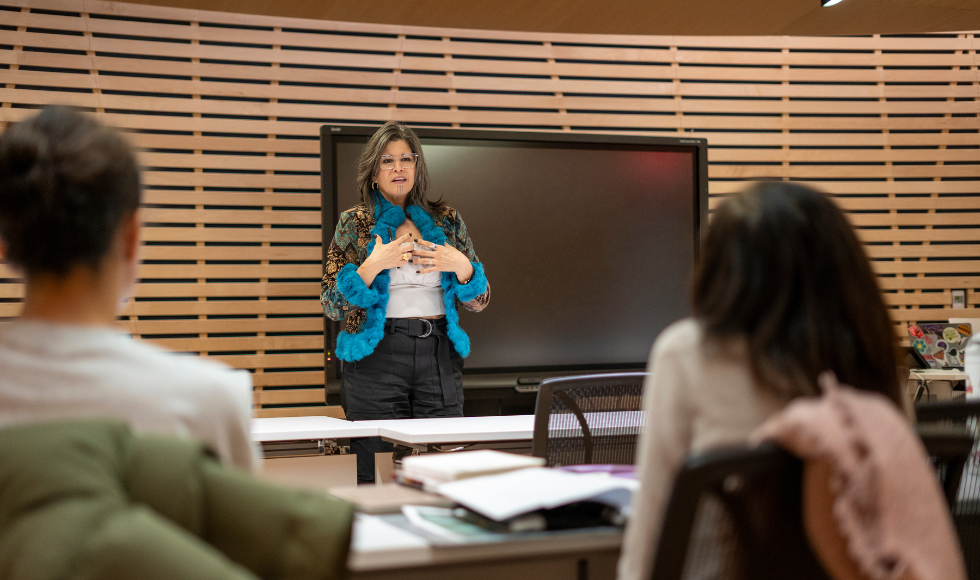McMaster launches world-leading Indigenous Studies MA program

Indigenous Studies professor and McMaster Indigenous Research Institute director Savage Bear teaches a class. McMaster will host its first cohort of Indigenous Studies graduate students this fall when it launches the new MA program, the first of its kind in Southern Ontario.
McMaster will host its first cohort of Indigenous Studies graduate students this fall, as it launches a new master’s program, part of its commitment to world-leading teaching and research in Indigenous studies.
The MA in Indigenous Studies is the latest chapter in the 30-year history of Indigenous Studies at McMaster, building on grassroots work by faculty, staff and community members who responded to the critical demand for Indigenous research and innovation in post-secondary education and beyond.
“McMaster’s Indigenous Strategic Directions continues to guide our efforts to advance a sustainable Indigenous research agenda on campus,” said President David Farrar.
“This program represents the next step toward growing Indigenous scholarship, celebrating Indigenous ways of knowing, and creating deeper connections with Indigenous communities.”
First established as an undergraduate program in 1992, the Indigenous Studies Department has witnessed a rise in student demand for Indigenous content, research and graduate-level studies. To date, the program has trained over 300 undergraduate students.
Until now, graduates had limited options to continue their studies in Indigenous Studies, a gap the new program is designed to fill.
The MA in Indigenous Studies is designed to retain and attract top Indigenous and non-Indigenous leaders in Indigenous Studies research, creation and policy (as well as other allied disciplines).
“McMaster has been a Canadian leader in Indigenous education for three decades,” said Susan Tighe, provost and vice-president (Academic). “I look forward to continuing to work together in support of students, faculty and staff so they can pursue excellence in Indigenous scholarship and research.”
The program will provide students with an immersive, multidisciplinary experience that centres Indigenous Studies research methodologies and creation, theory, ways of knowing, and epistemologies while placing community reciprocity at the forefront.
Focusing on regeneration and resurgence-based programming, students will be trained to be leaders in Indigenous-led, community-based research, knowledge creation and policy.
These courses will prepare graduates for the complex, historical and interpersonal nature of the work ahead of them, says Robert Innes, chair of the Indigenous Studies department.
“It’s important to us that the MA program is rooted in the community. Students will work closely with Indigenous faculty who have extensive experience in ethically cultivating community relationships,” said Innes.
“Students will also take a hands-on course that will emphasize experiential, service, and land-based learning, taking students out of the classroom and into community.”
During the program, the first Indigenous Studies graduate program in southern Ontario, students will be guided by McMaster’s substantial and diverse cohort of Indigenous faculty and instructors.
They include two Canada Research Chairs —Allan Downey and Chelsea Gabel — and the Paul R. MacPherson Chair in Indigenous Studies, Vanessa Watts.
“We are deeply grateful for our Indigenous faculty members’ contributions and commitment to advancing Indigenous education at McMaster and beyond,” said Social Sciences Dean Jeremiah Hurley. “This graduate program will provide new and innovative opportunities to foster Indigenous scholarship, ways of knowing and epistemologies in partnership with Indigenous communities.”
The program was approved by McMaster’s Senate in late December and subsequently received approval from the Ontario Universities Council on Quality Assurance on Jan. 26. Applications open on Feb. 12, 2024.
Visit the MA in Indigenous Studies website or email isgrad@mcmaster.ca for more information.

